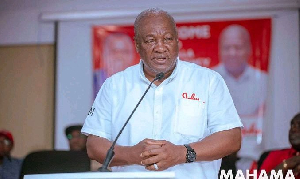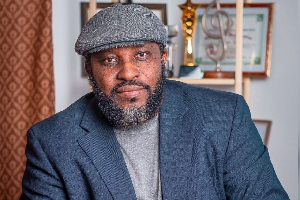Spencer Wan Blog of Tuesday, 7 January 2025
Source: Eric Afatsao
Mahama Runs From E-Levy, Covid Taxes, A Politician’s Strategic Retreat or a Missed Opportunity

In a dramatic turn of events, former President John Dramani Mahama has been accused of running from the controversial Electronic Levy (E-Levy) and Covid-related taxes, two issues that have dominated Ghana's political landscape for the past few years. Mahama, the flagbearer of the National Democratic Congress (NDC), has taken a cautious stance on these pressing topics, drawing both praise and criticism from different corners of the political sphere.
The E-Levy, which was introduced by the Akufo-Addo administration in 2022, has sparked intense debate across the country. While the government argues that the tax is essential for generating revenue to support infrastructure projects and the fight against poverty, critics, including Mahama and the NDC, have vehemently opposed it. Mahama’s refusal to publicly endorse or offer substantial critique of the tax has raised eyebrows among his supporters, some of whom feel that his silence could signal a strategic retreat rather than a firm stance on an issue of national importance.
The former President’s cautious approach to the E-Levy has been interpreted in various ways. Some view it as a shrewd move designed to distance Mahama from an unpopular policy that has sparked protests and public outcry, while others question whether his reluctance to engage in the debate is a sign of political weakness. Given the current economic challenges, including inflation and the devaluation of the cedi, the E-Levy has become a hot-button issue for voters, and Mahama’s avoidance of the topic may be seen as a way to protect his public image ahead of the 2024 elections.
In addition to the E-Levy, Mahama has also been noticeably absent from discussions surrounding taxes imposed during the Covid-19 pandemic. The government’s introduction of Covid-related taxes, aimed at financing the nation’s response to the health crisis, has generated mixed reactions, with some citizens arguing that the taxes were burdensome and failed to deliver the expected results. Mahama, who was in power during the early days of the pandemic, has refrained from engaging in these debates, leaving many to wonder if his avoidance is due to a fear of alienating voters who were heavily impacted by these economic policies.
Many analysts argue that Mahama’s retreat from both the E-Levy and Covid taxes may be a calculated decision designed to avoid further political backlash. The former President, known for his emphasis on social welfare, may feel that engaging too deeply in these contentious issues could alienate key demographics, especially the youth and small businesses who have struggled with the financial burden of these taxes.
However, Mahama's decision to sidestep these issues has not been universally welcomed. Critics within the NDC and other political factions have questioned his ability to lead with conviction if he consistently avoids engaging in pressing national debates. Some argue that by not taking a definitive position, Mahama risks appearing indecisive or evasive, which could hurt his credibility and influence in the upcoming elections.
Political strategists, however, suggest that Mahama’s tactic could be an attempt to avoid being tied to policies that have proven to be unpopular. By focusing on areas such as education, healthcare, and job creation, Mahama might be aiming to shift the narrative and offer Ghanaians a fresh vision for the country’s future—one that is distinct from the current government's handling of taxes.
As the 2024 elections approach, Mahama's stance on the E-Levy and Covid taxes will likely remain a central topic of debate. Whether his avoidance of these issues is a well-calculated political maneuver or a missed opportunity to demonstrate leadership remains to be seen. What is clear is that the political chess game is far from over, and Mahama’s next moves could be crucial in shaping the outcome of the upcoming elections. Only time will tell whether his strategy pays off or leaves him vulnerable to criticism from all sides.
MyNewsGh.com
Entertainment













